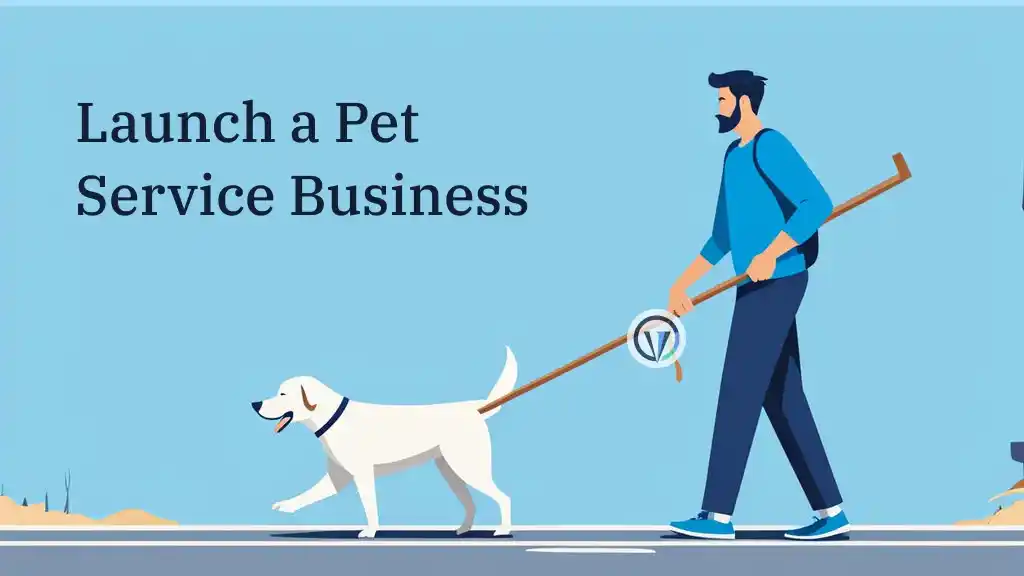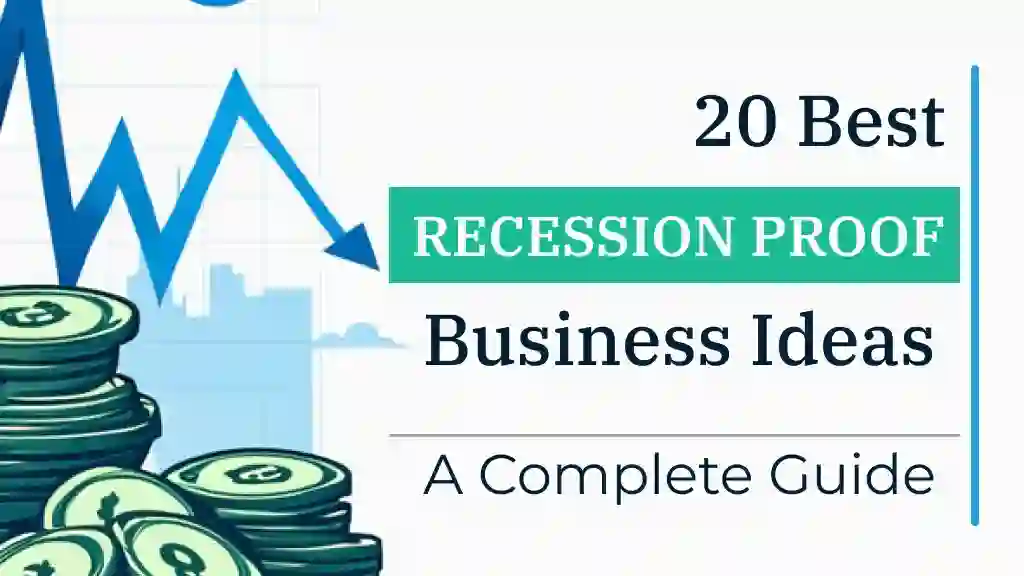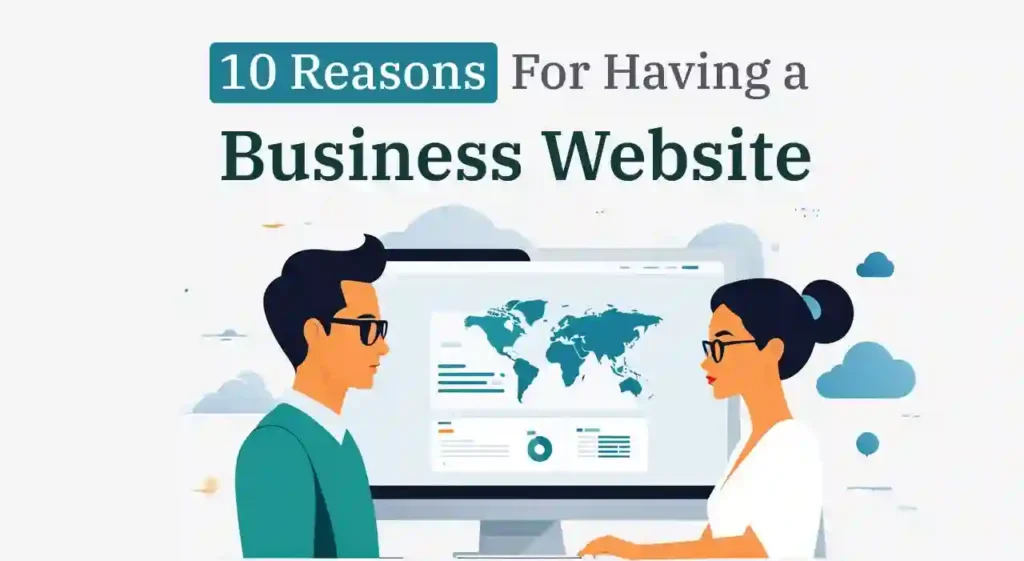Welcome to our guide on the best recession proof business ideas. During uncertain times in the market, stability becomes crucial. While traditional businesses may face challenges, there are entrepreneurs who excel in such situations. These individuals possess resilience and adaptability, creating business models that can withstand economic downturns.
In this article, we’re diving deep into the world of sustainable income streams during economic downturns.
We will look at creative ideas that remain strong in tough times, offering support when others struggle.
From strong business plans that can handle economic uncertainty to innovative anti-recession entrepreneur ideas that make the most of challenges, we have put together a complete list to motivate and support future business owners like yourself.
Forget about worrying about market ups and downs or losing sleep over financial problems. Take charge of your financial future and find opportunities during economic downturns.
20 Best Recession Proof Business Ideas
Table of Contents
1. Healthcare

Starting a healthcare business can be rewarding, especially during economic downturns. Here’s how you can start:
To start a healthcare business, identify your target market and the services you wish to offer. No matter what the time, people tend to get sick and have health issues.
Research the regulatory requirements in your area and obtain necessary licenses and certifications. Build a network of healthcare professionals, establish partnerships with suppliers, and invest in marketing to reach potential clients.
Healthcare is one of the most recession-resistant businesses, as people prioritize healthcare spending even during economic downturns.
According to the Bureau of Labor Statistics, the healthcare industry continued to grow during the 2008 recession, adding over one million jobs. Additionally, with an aging population and increasing healthcare needs, the demand for healthcare services remains high regardless of economic conditions.
The minimum investment required to start a healthcare business varies depending on the specific niche and scale of operations.
For example, starting a home healthcare agency may require initial investments in licensing, insurance, staff training, and marketing, ranging from $10,000 to $50,000 or more.
Meanwhile, launching a telemedicine platform could involve lower startup costs, primarily focusing on technology infrastructure and marketing efforts, typically ranging from $5,000 to $20,000.
2. Financial Services
Launching a financial services business involves acquiring the necessary licenses and certifications, such as becoming a registered investment advisor or obtaining licenses for insurance sales.
Define your target market and services offered, whether it’s financial planning, investment management, or insurance brokerage.
Develop a robust business plan outlining your services, pricing structure, and social media marketing strategies.
Build a professional network and establish credibility through certifications and industry affiliations.
Financial services are essential during economic downturns as individuals and businesses seek guidance to navigate financial challenges.
According to the U.S. Bureau of Labor Statistics, the finance and insurance sector remained relatively stable during the 2008 recession, with minimal job losses compared to other industries.
Additionally, during times of economic uncertainty, demand for services such as debt management, retirement planning, and risk management typically increases, presenting opportunities for financial service providers.
The investment required to start a financial services firm varies. For a small-scale operation, initial costs can range from $10,000 to $20,000, covering legal documentation, office space, and initial marketing efforts to establish a presence in the market.
3. Discount Stores
Discount stores are a smart choice for entrepreneurs looking to start a business that can withstand economic fluctuations. Here’s a brief guide:
Secure a retail space in a high-traffic area, negotiate favorable lease terms, and set up your store layout to optimize customer experience.
Source products from wholesalers, manufacturers, or distributors offering discounted prices.
Develop a pricing strategy to attract budget-conscious shoppers and implement cost-effective marketing campaigns to drive foot traffic to your store.
According to a study by Nielsen, during the 2008 recession, discount stores experienced a significant increase in sales as consumers sought affordable alternatives to traditional retailers.
Moreover, discount stores often outperform other retail sectors during economic downturns due to their value-oriented offerings, attracting a broad customer base seeking discounted products across various categories.
Opening a discount store requires an initial investment of $50,000 to $200,000 or more, depending on factors like location, store size, inventory selection, and marketing budget.
Expenses include securing a retail space, buying fixtures and equipment, obtaining permits and licenses, and stocking up on inventory. Owners should prioritize budgeting for inventory procurement and store setup.
4. Food and beverages
Starting a food and beverage business can be a resilient move, as this industry often remains robust even during economic downturns.
Begin by identifying your niche, whether it’s a restaurant, food truck, café, or beverage delivery service. Next, create a business plan, secure funding, and choose a location with high foot traffic.
Ensure compliance with health and safety regulations and build a menu that caters to your target audience.
Implement effective marketing strategies to attract customers and ensure repeat business.
Food and beverage businesses can leverage recessions by offering affordable comfort foods that appeal to budget-conscious consumers.
According to industry reports, during the 2008 recession, the food and beverage sector experienced modest growth, with consumers seeking affordable dining options and indulging in comfort foods.
Additionally, innovative concepts such as food delivery services and meal kit subscriptions have seen increased demand during times of economic uncertainties.
Historically, companies like Coca-Cola, PepsiCo, and Nestle have emerged from recessions stronger by adapting to changing consumer behaviors and focusing on low-cost, high-demand products.
The minimum investment for starting a food and beverage business can vary widely. For a modest establishment, initial costs can range from $10,000 to $50,000, covering equipment, inventory, permits, and marketing to establish a foothold in the market.
5. Accounting
To start an accounting business, get the right qualifications (degree in accounting or finance) and certifications (CPA or CMA). Choose your target market and services (bookkeeping, tax prep, financial consulting). Set up your office, determine prices, and create a marketing strategy (networking, referrals, online presence).
Accounting services are essential during economic hardship, providing financial advice to businesses and individuals.
The demand for these services remains steady or increases during downturns, as businesses prioritize financial management, tax planning, and regulatory compliance. Outsourcing accounting tasks can also be a cost-effective solution for businesses looking to streamline operations and reduce expenses.
The cost of starting an accounting business can vary based on factors like office space, equipment, software, marketing expenses, and certifications.
Starting from home may only require a small investment in software licenses, marketing materials, and insurance, typically ranging from $1,000 to $5,000.
However, establishing a full-service firm with a physical office, staff, and marketing efforts may require a larger investment ranging from $10,000 to $100,000 or more, depending on services provided.
Related Article: Top 30 Lucrative Side Hustles for College Students
6. Childcare

Launching a childcare business requires detailed planning and following legal guidelines.
Begin by conducting market research to identify the demand for childcare services in your area and understand the preferences of parents regarding hours, pricing, and educational philosophy.
Secure appropriate licensing and permits, ensuring compliance with local regulations and safety standards.
Design a safe and stimulating environment for children, with age-appropriate activities and amenities. Hire qualified staff trained in childcare and first aid, and develop policies and procedures to ensure the well-being of children under your care.
Childcare services are considered as one of the recession-resistant businesses, as parents prioritize childcare regardless of economic conditions.
According to the U.S. Bureau of Labor Statistics, the demand for childcare services has remained steady over the years, with an increasing number of dual-income families and single parents requiring reliable childcare solutions.
During economic downturns, parents may face challenges such as job loss or increased work hours, leading to a greater need for affordable and dependable childcare options.
The cost to start a childcare business varies based on factors like size, location, fees, staffing, and expenses.
For instance, starting a home-based childcare may need $1,000 to $10,000 for safety equipments, toys, and licenses. But, setting up a childcare center with a facility, playground, and materials could require $50,000 to $500,000 or more, depending on services provided.
7. Home repair
Starting a home repair business is a practical choice, offering services that remain in demand regardless of economic conditions.
Starting a home repair business requires a combination of technical skills, business acumen, and customer service expertise. Begin by identifying your target market and the specific services you’ll offer, such as plumbing, electrical work, carpentry, or general handyman services.
Invest in high-quality tools and equipment to perform repairs efficiently and effectively.
Market your services through word-of-mouth referrals, online platforms, and local advertising to reach homeowners in need of repairs.
Also Read: Offline Marketing Strategies for Small Businesses
During economic downturns, homeowners may postpone large-scale renovations or upgrades but still require timely repairs to maintain the safety, functionality, and value of their homes.
The industry is valued at $457 billion annually, highlighting its robustness. Offering cost-effective solutions can attract more customers looking to maintain their property values.
The cost to start a home repair business can differ based on services, tools, and marketing. For example, a one-person handyman business may need $500 to $5,000 for tools, transport, and ads.
8. Maintain a lean inventory
Starting a business focused on maintaining a lean inventory is a strategic approach, especially in uncertain economic times. Here’s a concise guide to start:
“Maintain a lean inventory” means keeping only the essential supplies you need, avoiding stockpiles. It’s like having a perfectly organized pantry – efficient and saves you money!
To start a business with a lean inventory model, assess current stock levels and implement Just-In-Time (JIT) ordering to minimize excess. Embrace continuous improvement methodologies like Kaizen and Kanban to streamline operations and reduce waste.
A lean inventory model is advantageous during a recession as it reduces carrying costs, which can account for up to 30% of the inventory value per year.
It also improves cash flow by minimizing capital tied up in stock, allowing for reinvestment in growth areas.
The minimum investment for starting a lean inventory business varies, but it generally includes costs for technology, training, and process optimization.
9. Auto repairs
Starting an auto repair business is a good choice, as it tends to be one of the recession-resistant businesses.
Begin by acquiring the necessary technical skills and certifications, such as Automotive Service Excellence (ASE) certification, to demonstrate expertise and credibility in the field.
Secure a suitable location for your auto repair shop, considering factors such as accessibility, visibility, and zoning regulations.
Invest in high-quality tools, equipment, and diagnostic technology to perform repairs and maintenance efficiently.
Auto repair shops can thrive during recessions as people are more likely to repair their existing vehicles rather than purchasing new ones. This industry benefits from the ongoing need for vehicle maintenance and repairs, which can lead to steady revenue streams.
The initial investment for an auto repair shop can range from $50,000 to $100,000 for a modest setup to $150,000 to $300,000 for a full-service shop in a prime location. This includes costs for leasing, equipment, and initial inventory.
10. Pet services

To launch a pet services business, begin with market research to identify the needs of pet owners in your area.
Starting a pet services business involves identifying your niche within the pet care industry, whether it’s dog walking, pet sitting, grooming, training, or boarding.
Obtain the necessary certifications and insurance, and consider a location that’s convenient for your target clientele.
The pet industry is considered recession-proof because pet owners prioritize their pets’ needs, maintaining or even increasing spending during tough economic times.
In 2021, $123.6 billion was spent within the U.S. pet industry, with significant portions allocated to services like grooming and training. This trend is expected to continue, making pet services a robust business choice.
Launching a dog walking or pet sitting business from home may require minimal investment in marketing materials, insurance, and basic pet care supplies, typically ranging from $500 to $5,000.
11. Home Improvements
Launching a home improvements business entails leveraging skills in renovation, remodeling, or repair work. Begin by identifying your niche within the home improvements sector, such as kitchen renovations, bathroom remodeling, or general home repairs.
Build a skilled team and focus on providing exceptional customer service.
During economic downturns, home improvement companies can thrive because homeowners choose to upgrade their existing homes instead of relocating. By providing affordable renovations and embracing technology, these businesses can attract customers who want to improve their living spaces without spending too much money.
Initial costs may include purchasing tools, securing insurance, and marketing materials, typically ranging from $5,000 to $50,000 or more, depending on the scope of services offered and business location.
12. Property Management
Establishing a property management business involves overseeing and maintaining real estate properties on behalf of owners.
Begin by obtaining necessary licenses and certifications, such as a real estate broker’s license or property management certification.
Build a network of property owners, landlords, and tenants through networking and marketing efforts. Implement systems for rent collection, property maintenance, and tenant screening. Then utilize property management software to streamline operations and enhance efficiency.
During economic downturns, property management companies can flourish by earning consistent revenue from rent and fees. They take advantage of the increased need for rental properties and utilize technology to efficiently handle their portfolios, which is vital when resources are limited.
The minimum investment required to start a property management business varies depending on factors such as office space, staffing needs, and technology investments.
Initial costs may include licensing fees, software subscriptions, marketing expenses, and insurance, typically ranging from $10,000 to $50,000 or more, depending on the scale and scope of operations.
13. Build Professional Relationships
To establish a business focused on building professional relationships involves providing networking opportunities, training, and resources to help individuals and businesses cultivate meaningful connections.
Develop a platform or organize events such as networking mixers, workshops, or conferences to facilitate connections and knowledge sharing.
Offer training programs, seminars, or webinars on networking skills, communication strategies, and relationship building. Create online communities or forums where members can engage, collaborate, and support each other.
During recessions, strong professional networks become even more valuable. They provide access to new opportunities, insights, and support systems that can help navigate economic challenges.
Building professional relationships can lead to better job security, career advancement, and business growth, as these connections often result in mutually beneficial collaborations.
The investment required to start a business focused on building professional relationships can be minimal, primarily involving costs for marketing, venue rentals for events, and materials for workshops.
14. Online business Manager
Establishing an online business management (OBM) service involves providing virtual assistance and operational support to businesses seeking to streamline their operations and maximize efficiency.
Begin by defining your service offerings, such as project management, administrative support, or digital marketing coordination. Develop a website or online portfolio showcasing your skills, experience, and testimonials.
Set up systems for client communication, project management, and billing to streamline operations. Offer flexible pricing options, such as hourly rates or retainer packages, to accommodate different client needs.
OBMs are valuable during recessions as they help businesses streamline operations and reduce costs. They can manage remote teams effectively, adapt strategies to changing market conditions, and ensure business continuity, which is crucial for survival during economic downturns.
The minimum investment required to start an online business management service is relatively low compared to traditional brick-and-mortar businesses.
Initial costs may include website development, marketing materials, software subscriptions, and administrative expenses, typically ranging from $1,000 to $10,000 or more, depending on the scale and scope of services offered.
15. Freelancing
Establishing a freelancing business involves offering specialized services or expertise on a contract basis to clients across various industries.
Start by identifying your skills, talents, and areas of expertise, such as writing, graphic design, web development, or consulting.
Develop a portfolio showcasing your work, experience, and capabilities. Create profiles on freelancing platforms such as Upwork, Freelancer, or Fiverr to connect with clients and bid on projects.
Set competitive pricing based on your skills, experience, and market demand. Provide excellent customer service and deliver high-quality work to build a strong reputation and attract repeat business.
Freelancing can be a boon during recessions as it offers flexibility and income diversification. Freelancers can adjust their services to meet changing market demands and often have lower operational costs than traditional businesses.
The investment to start freelancing is relatively low. Essential costs may include setting up a website, marketing, and purchasing any necessary equipment or software. Initial expenses can range from as little as $100 to $3000, depending on the nature of the services offered.
16. Technology Support

Starting a technology support business involves offering technical assistance to individuals and businesses facing issues with their devices or IT systems. Define your target market and services, such as hardware repairs, software installation, or cybersecurity solutions.
Technology support businesses can be profitable during recessions, as they provide essential services that help other businesses reduce costs and maintain operations.
They can capitalize on the talent pool expansion due to layoffs and offer competitive services that are in high demand during economic downturns.
The initial investment for starting a technology support business can range from $2,000 to $10,000, covering equipment, software subscriptions, and initial advertising.
17. Retail
Launching a retail business involves selling goods directly to consumers through physical or online storefronts. Begin by selecting a niche or product category based on market demand and your interests or expertise.
Research your target market, competition, and location to identify opportunities for differentiation and growth.
Secure a retail space or establish an online store, ensuring visibility, accessibility, and compliance with zoning regulations. Source inventory from suppliers or wholesalers, negotiate favorable terms, and manage inventory levels to meet demand.
Retail businesses can adapt during recessions by offering discounted products or diversifying their inventory to include essential goods. They can capitalize on reduced rental costs and negotiate better terms with suppliers. Consumer behavior shifts towards value and convenience, which retailers can leverage to maintain sales.
The minimum investment for starting a small retail store can range from $2000 to $10,000, covering rent, equipment, and initial inventory. This can vary based on location and the scale of the business.
18. Cleaning services
Starting a cleaning services business involves providing professional cleaning and janitorial services to residential or commercial clients. Begin by identifying your target market, whether it’s homeowners, businesses, or specific industries such as healthcare or hospitality.
Cleaning services can be recession-proof as cleanliness is a necessity, not a luxury. During economic downturns, businesses and individuals still require cleaning services, which may even see an uptick in demand for sanitization.
The initial costs may include purchasing cleaning supplies, equipment, and insurance, typically ranging from $500 to $5,000 or more, depending on the size and scope of your business.
19. Electrical Services
Launching an electrical services business involves providing electrical installation, repair, and maintenance services to residential, commercial, or industrial clients.
Start by obtaining the necessary licenses and certifications required to perform electrical work in your area. Invest in high-quality tools, equipment, and safety equipment to ensure compliance with industry standards and regulations.
Develop a range of services, such as electrical wiring, lighting installation, panel upgrades, and troubleshooting.
According to industry data, the demand for electrical services remains steady, with homeowners, businesses, and contractors seeking reliable electrical contractors for new construction projects, renovations, and repairs.
The initial investment required for an electrical shop and service business in India can vary anywhere from ₹2 lakh to ₹20 lakh, depending on your location (suburban area or metro city).
20. Baby products
Starting a baby products business involves offering a range of products tailored to meet the needs of parents and caregivers for infants and young children.
Begin by identifying your target market, whether it’s parents-to-be, new parents, or families with young children.
Research popular baby products and trends to determine your product selection and pricing strategy. Develop relationships with suppliers, manufacturers, or distributors to source high-quality products at competitive prices.
Create a professional ecommerce website or online store to showcase your products and attract customers. Utilize online advertising, social media, and parenting forums to market your products and generate sales.
Baby products are considered ‘recession-proof’ because parents prioritize their children’s needs. High-value items that serve multiple purposes or last through various stages of childhood tend to maintain sales growth even in tough economic times. The average spend on baby products has been increasing, indicating strong market resilience.
To start this business, initial costs may include purchasing inventory, setting up an online store, and investing in marketing materials, typically ranging from $2,000 to $50,000 or more, depending on the scale and scope of your business.
Conclusion
In conclusion, the recession-resistant business ideas mentioned provide entrepreneurs with opportunities for success in tough economic times.
From essential services like healthcare and property management to innovative ventures like technology support and freelancing, each business model shows resilience and growth potential.
By meeting market demand, adapting to consumer behaviors, and making wise investments, aspiring entrepreneurs can build thriving ventures that withstand economic downturns and emerge stronger in the end.
FAQs
Why are healthcare and property management considered recession-proof businesses?
Healthcare remains essential during economic downturns as people prioritize their well-being. Property management services see steady demand as property owners seek professional management to maximize returns.
What makes technology support and freelancing attractive business options during recessions?
Technology support is in high demand as businesses optimize their infrastructure, while freelancing offers flexibility and cost-effective solutions for businesses.
How can entrepreneurs minimize risks when starting recession-proof businesses?
Entrepreneurs can minimize risks by conducting thorough market research, investing wisely, and adapting their business strategies to changing economic conditions.



Wow superb blog layout How long have you been blogging for you make blogging look easy The overall look of your site is magnificent as well as the content